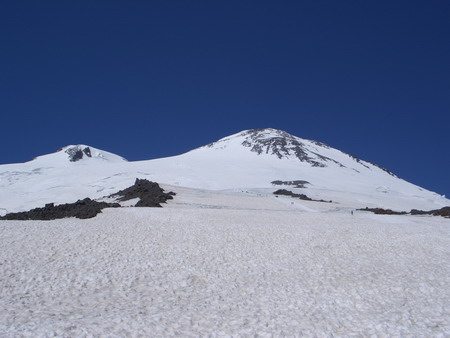Mount Elbrus: the last refuge for skiing in Europe
Published: 29 August 2007
|
|||||
It is the highest mountain in Europe and at some point in the 21st century it could become the last place on the continent where people can still enjoy downhill skiing due to climate change.
This is not Mount Blanc in the Alps but Mount Elbrus in the north Caucasus of southern Russia where the more extreme sportsperson can reliably snowboard down its upper slopes in the height of the summer holiday season.
Alpine resorts in central Europe have suffered from the effects of rising temperatures in recent years, with shorter skiing seasons and lack of snow on the lower slopes. The largest mass of ice in the Alps - the Aletsch glacier of southern Switzerland - will disappear within 80 years if it continues to recede as fast as it has in recent years.
Mount Elbrus, however, stands at 5,642 metres, compared with Mount Blanc`s 4,807 metres, and Russian glaciologists have reported lower winter temperatures in recent years and higher snowfall due to regional climatic conditions that appear to run counter to the global trend - and of course favourable to the nascent Russian skiing industry.
Elbrus falls on the European side of the great tectonic rift running through the Caucasus that separates Europe from Asia. It has never been a popular tourist destination for European skiers but that could soon change due to a combination of factors - including climate change.
The Elbrus region, known as the pearl of the north Caucasus, has already been chosen as the reserve location for the 2014 Winter Olympics. This means that it will become the main Winter Olympic site if there is not enough snow at the preferred location of Krasnya polyana, near the Black Sea resort of Sochi, which rises to a maximum altitude of only 2,230 metres.
Russia is already investing heavily in new infrastructure to take advantage of the rise in winter tourism expected in the run-up to the 2014 Winter Olympics. French and Canadian companies are helping to build state-of-the-art ski lifts and other modern skiing facilities while a new 40-mile, ice-free road is being built from Sochi to Nalchik, the capital of Kabardino-Balkaria, the Russian republic in which Elbrus stands.
Sergei Tsoy, a spokesman for the president of the republic, Arsen Kanokov, said that the choice of Sochi by the International Olympic Committee is a vote of confidence in the stability of the Caucasus following years of brutal conflict in nearby Chechnya. "It is a signal to investors that the war in the Caucasus is in the past. Elbrus has been declared a reserve area because the snow here never melts. If there is no snow at all in Sochi then the Olympic Games will move here," Mr Tsoy told The Independent.
To allay fears over security, a vast array of CCTV cameras and surveillance equipment suspended on barrage balloons will watch over the games, Mr Tsoy said. It was after all only two years ago that Chechen militants mounted co-ordinated attacks on the capital, Nalchik - the sort of high-profile terrorist incident the authorities want to avoid.
There are still concerns about security in this part of the world, which is defined as "category 4" in terms of the five-point security classification of the United Nations - the same classification given to Iraq, largely for political reasons. British embassy officials based in Moscow said that they do not recommend visits to the region by UK citizens and their own diplomats can only come here with armed bodyguards. Mount Elbrus has two summits. The western peak stands at 5,642 metres and a wind-swept "saddle" separates it from the eastern summit, which is slightly lower at 5,621 metres. Both peaks are permanently covered in snow and ice and the area is famous for its dramatic glaciers which feed a handful of rivers throughout the summer months.
Alexander Oleinikov, an avalanche specialist at Moscow State University`s Elbrus field station at Azau, said that since 1962, when long-term monitoring of the region`s climate began from a series of weather stations, seven of the 10 snowiest winters have occurred in the past 10 years.
Although the many glaciers around Elbrus have been receding for the past century or more - probably due to higher summer temperatures - winter temperatures have generally experienced a downward trend because of regional climatic effects that are little understood, Dr Oleinikov said.
Mount Elbrus, however, does not appear to be totally immune to climate change. This summer is likely to be a record year for glacial melting, according to Natalia Volodicheva, a glaciologist at Moscow
